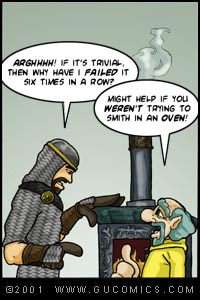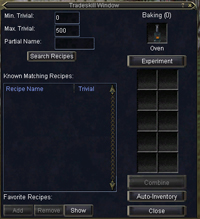| Have you ever wondered where those special food and drink items on player vendors in bazaar came from? Perhaps they were player crafted using baking skills! Here are some tips on learning to use tradeskills in EverQuest. |
| EverQuest Tradeskills With a tradeskill, you can make certain items by assembling the necessary pieces. Some tradeskills require you to seek out a merchant and buy a book or kit specific to that skill. Others (like Fishing) only require you to purchase the proper equipment. Before you can learn most skills, you might want to visit a merchant that specializes in that trade. He or she will sell you a book that outlines the basics for a certain skill. Once you've read it and acquired the necessary kit, components, and/or ingredients, you can make pottery, bows and arrows, bread products and more. To make an item, you need all of the ingredients and the right kind of container. You can find tradeskill objects located in most cities, the Plane of Knowledge, and other heavily active areas. You can also buy some tradeskill containers that can be put into your inventory from merchants or other players. Some recipes may require a more advance tradeskill container. An example of this would be a combine required for a quest. If you're skilled enough, and lucky enough, you'll succeed in your creation. A new item will show up in your inventory. Keep in mind that you'll occasionally fail, with the possibility of losing all items in the container. However, both successes and failures can lead to increases in a given tradeskill. Note: Never stack items when combining them. All items in the combination must be separate. Available Tradeskills and Associated Skills
The Tradeskill Window |
| Search Section: With this section, you can use the Search Recipes button to search through a list of known recipes based on minimum and maximum skill levels and partial names. Once you search for the recipes, a list of Known Matching Recipes will appear. It lists the Recipe Name and the level it becomes Trivial, easier to make.
|
| Favorite Recipes: This option allows you to Add, Remove or Show your favorite Recipes list. To switch back to search, click on Search Recipes again. Skill and Container Section: This area of the window displays the Tradeskill Container that is currently open and displays what your current skill level is for the skill that uses that container. Experiment: Click this button to use the old tradeskill interface to experiment with recipes you don't know. Before opening a container, you can also use Ctrl Right Click to open up the old window. As mentioned above, you can set the default for this toggle under the Options menu. Combine Section:
Click this button to close the Tradeskill Window. Acquiring Recipes You can purchases recipes from tradeskill venders, other players, receive them as a quest reward or quest task, or find it as a loot drop. Some recipes may require more than one type of tradeskill to complete the final version. |
 | EQ Traders Corner |  |
| Here are some more detailed tradeskill guides and FAQs that our friends over on EQ Traders Corner have put together over the years: Before you start... A few words from Niami by Niami DenMother (Tunare Server) If you've never tried a tradeskill before, there are a several things that you should know. | ||
The standard, or "main" tradeskills are: Baking, Brewing, Fletching, Jewelcraft, Tailoring and Smithing. All other tradeskills are restricted to certain races (tinkering), certain classes (alchemy, make poison, research), or are level capped (fishing). The standard skills could, theoretically, be raised to 200 by a level 1 character, but we don't recommend it. ;) Remember that training points can only be spent on tradeskills early on. Once you hit a skill of 21 in the standard tradeskills, you MUST gain skill increases through hands-on-practice. While tradeskills in EQ increase with practice, tradeskills cost you money (in supplies), regardless of success or failure. For the more expensive skills (such as jewelcraft), it's wise to not only stockpile some money in advance, but also spend the training points to get to skill 20 before trying the skill. Low-level players: Before you even train in a tradeskill, you should check to be sure that the materials you will need to practice your skill are available nearby. If they are not easily available, you have to make a hard decision -- do you want to try the skill anyway or do you want to try another tradeskill? For example, if you want to bake, and the only baking supplies within the nearest several zones are batwings, you'll realize you're going to be running through a lot of zones to get some of your more basic supplies. This isn't meant to discourage you, but to make sure you don't spend a lot of training points before you realize the scope of the task ahead of you. (Higher level players tend to move around a lot, so this isn't as much of an issue for them.) When you see mention of a "trivial" on a chart, it means that at that skill level, you will no longer gain skill increases from making the item. You will, however, still continue to fail quite a bit when making the item. Just because something is trivial does not mean you can do it in your sleep. Eventually, as your skill improves, your chance of failing at making the item will decrease, but there's generally always a chance of failure. (Silk swatches and silk thread are an exception to this).
|
| To discuss tradeskilling in EverQuest, you can visit the Artisans Way (Tradeskill Discussion) message board over on the official forums. |







